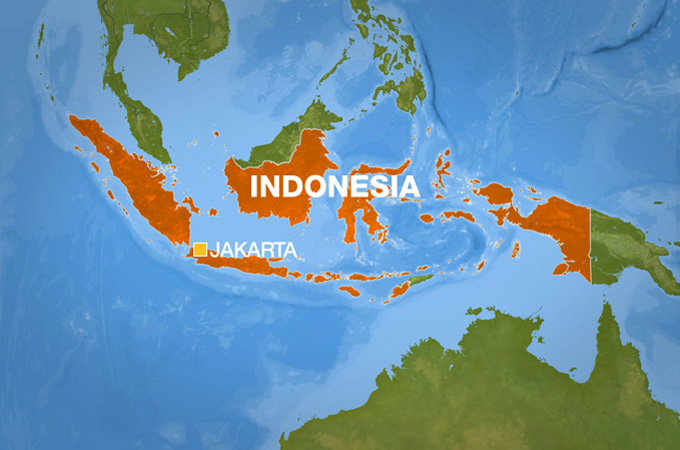Country profile: Indonesia
Key facts on the world’s most populous Muslim nation.

 |
Encompassing about 17,000 islands spread across 5,000km and three time zones, Indonesia is the world’s largest archipelagic state.
It was colonised by the Dutch in the 1600s. After Japanese occupation in World War II, nationalist forces launched a bitter four-year struggle against the return of Dutch colonial rule, finally winning independence for the new nation of Indonesia in 1949.
Keep reading
list of 4 itemsThis researcher found billions in ‘invisible’ gold in Jo’burg’s mine dumps
Are seed-sowing drones the answer to global deforestation?
Rainfall set to help crews battling wildfire near Canada’s Fort McMurray
| Politics |
Indonesia is a republic and historically the political system has concentrated power in the hands of the presidency.
Since the fall of former President Suharto in 1998, however, Indonesia’s political structures have been undergoing major reform, giving more voice to Indonesia’s two houses of parliament.
Suharto, who took power following a failed coup attempt in 1965 – the exact circumstances of which have never been made clear – ruled Indonesia unchallenged for more than three decades.
He resigned in 1998 in the face of student-led protests triggered by the Asian financial crisis.
Indonesia held its first direct presidential election in 2004, won by the current president, Susilo Bambang Yudhoyono.
| Economy |
Indonesia’s economy was hit hard by the Asian financial crisis in 1997. The value of the national currency nosedived, millions were thrown out of work, and economic growth ground to a halt.
However, the country weathered the recent global financial crisis relatively smoothly because of its heavy reliance on domestic consumption as the driver of economic growth. In 2009, Indonesia outperformed its regional neighbours and joined China and India as the only G20 members posting growth during the crisis.
But Indonesia still struggles with poverty and unemployment, inadequate infrastructure, corruption and unequal resource distribution among regions.
Indonesia’s main exports include oil and gas, timber products and textiles.
Its economy also depends heavily on tourism, particularly on the island of Bali, although a series of terrorist attacks there have damaged the industry. Visitor arrivals on Bali were hit hard by the bomb attacks of 2002 and 2005.
| Geography |
Straddling part of the so-called Ring of Fire in the western Pacific, Indonesia sits on one of the most seismically active regions of the world. Earthquakes are common and occasionally severe.
In late 2004, a powerful undersea earthquake off the island of Sumatra triggered a tsunami that swept across much of the Indian ocean, killing an estimated 200,000 people. More than half of the dead came from Indonesia.
Indonesia is home to more than 70 active volcanoes. While producing occasionally deadly eruptions, the volcanoes also provide Indonesia with some of the most fertile agricultural land on the planet.
The country’s environmental landscape ranges from pristine rainforest – much of which is severely threatened by logging and agricultural expansion – to arid semi-desert in the islands of Nusa Tengarra, east of Bali.
| Society |
According to official statistics, Indonesia is the world’s most populous Muslim nation, with about 86 per cent of its 240 million people professing to follow Islam.
Ethnically and linguistically, however, it is very diverse, with more than 20 ethnic groups and more than 300 recorded languages spoken across the archipelago.
Nonetheless, education programmes and the promotion of the national language, Bahasa Indonesia, have helped to create a sense of national identity.
Indonesia prides itself on its “Unity in Diversity” – the country’s national motto – but outbreaks of inter-religious and inter-ethnic violence do periodically flare up, most recently in the provinces of Kalimantan, Maluku (The Moluccas) and central Sulawesi.
| Key dates |
1949 – Independence from Dutch colonial rule
1965 – Failed coup leads to Suharto taking presidency in 1966
1997 – Asian financial crisis hits, triggering riots and forcing Suharto from power
1999 – Free elections are held. Abdurrahman Wahid becomes the first elected president
2002 – East Timor declared independent; Bali nightclub bombing leaves 202 dead, most of them tourists
2004 – Asian tsunami kills more than 130,000 in Indonesia. Susilo Bambang Yudhoyono wins the presidential elections
2005 – Government signs a peace deal with Aceh separatists providing for rebel disarmament and the withdrawal of government troops
2006 – An earthquake kills thousands of people on Java
2009 – Twin suicide bombs at hotels in Jakarta kill nine people and injure scores